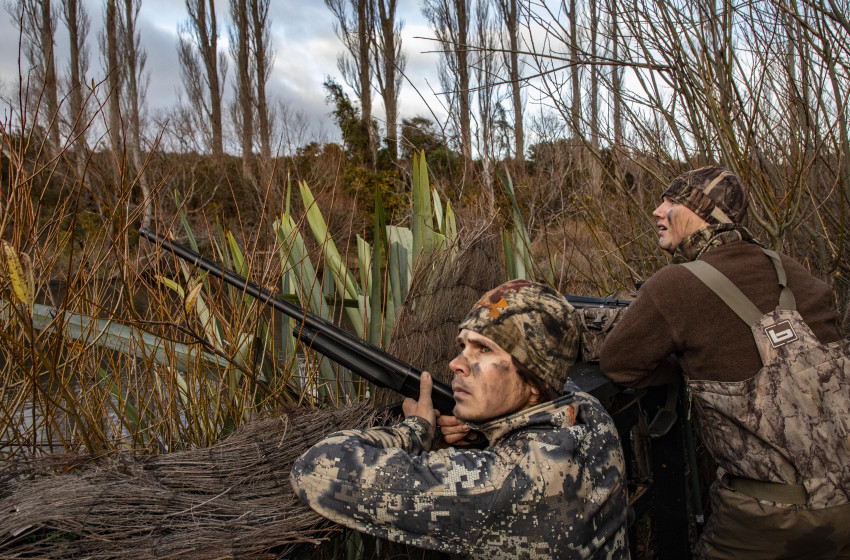Both Barrels April 2021
- North Canterbury
- 15/04/2021

North Canterbury Fish & Game want to wish all of the game bird hunters in the region the best for the coming season
After last years delayed season, things are looking good for the 2021 game bird season with healthy populations of birds observed around the region.
Regulation Changes
Two proposals were submitted to North Canterbury Fish & Game Council following last year’s game bird hunting season asking for a special mallard hunting season to be introduced in February, along with a request for additional opportunity to hunt pheasants.
Following the end of the extended game bird season for swans and paradise shelduck in hunting area B (27 July – 27 September 2020, where a daily limit of 20 of each bird is allowed), a phone survey was carried out on 199 licence holders (9% of North Canterbury game bird licence holders).
The purpose of this survey was to gain a better understanding of the numbers and percentages of hunters that used the extended gamebird season.
To summarise the results, 14% of game bird licence holders hunted during the extended season, with over 80% of those surveyed hunting for only four days or less.
Staff also looked at the 2020 National Gamebird Harvest Survey data, along with data from the Central South Island extended hunting season for paradise shelduck.
Hunting activity in the North Canterbury region during the extended season (the firsttwo weekends in February) is estimated to account for between 3% and 8% of whole season hunting and harvest effort, and therefore hunter effort is not thought to have any adverse impact on the sustainability of the paradise shelduck population.
While the extended season is used by a small proportion of hunters, these are usually the more experienced and active hunters.
The extended season for mallards, therefore, presents a valued opportunity for these hunters.
On the Canterbury plains, waterfowl particularly mallard ducks, gather and feed vigorously on grain crops in mid to late summer.
This falls outside the normal waterfowl hunting season where no opportunity exists for hunting, other than where affected landowners seek to control birds through permits.
This is a missed opportunity to provide recreational hunters with more hunting from their licence and a different hunting experience – dryland rather than a wetland.
A summer mallard hunting season will be opened on the first two weekends in February 2022 (in line with Central South Island Fish & Game), with a daily bag limit of 10 mallards.
This will apply to both areas A and B, hunting is only permitted over paddocks and must be more than 200m from any water body.
The pheasant hunting season will be extended from one weekend to three weekends beginning the first Saturday in June 2021 (excluding the long Queens Birthday weekends), with a daily bag limit of one cock pheasant.
To ensure there are not any potential impacts, adverse or otherwise, of these regulation changes, these extended seasons will be monitored with the use of additional phone harvest surveys to cover these periods.
Pegging Day: Following a number of complaints from hunters over the tagging of maimais on public land, Fish & Game remind hunters to take a photo of the tag site at their pond, which will automatically have a digital date stamp associated with it.
Important Dates:
Opening Day: Saturday, May 1, 6:45am – Closing Day: Sunday, July 25, 2021.
Cock Pheasant Season: 12, 13, 19, 20, 27, 28Jun2021,(three weekends only)
Summer season for Grey, mallard duck and any hybrid of those species,5 to 6 and 12 to 13 Feb 2022
Summer season for Paradise shelduck,29Jan to 13Mar 2022, area A with a daily limit of 15, area B daily limit of 20.
Sports Fish & Game Management Plan
The Conservation Act 1987 requires each Fish & Game council to have a Sports Fish and Game Management Plan and to review the plan every 10 years.
The Canterbury region is going to review the Sport Fish and Game Management plan this year.
The plan will set the strategic direction, objectives and policies for sports fish and game bird management over the next ten years.
The council will be consulting with various interest groups, clubs, and licence holders to ensure a wide range of issues are considered.
A lot of changes can occur in ten years when it comes to habitats.
Canterbury has seen significant changes in regards to land use, water abstraction and climate.
The challenge that Fish & Game has to meet is how to provide the maximum opportunities for anglers and hunters while sustainably managing the resource when the habitat is changing so rapidly.
The plan will be publicly notified later in the year, however, licence holders are reminded that they can contact us anytime if they have ideas that can contribute to the management of the Fish & Game resource.
Steve Terry, North Canterbury Fish & Game Officer.